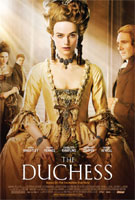The Duchess is a sobering look at the darker side of pre-Victorian life, the side that the Austens and Brontes of the world would have you believe never existed. While those endless adaptations of their work might make you think that eighteenth century England was all merry dances, flouncy dresses and chasing after brooding alpha-male types; the truth about the way of life at that time was far less fanciful. These are days when not even all men have rights yet, so women are subjected to arranged marriages of convenience and dealt with more as commodities and baby-machines than actual people. There are no dew-soaked wet-shirted romps or happy endings here, but there is something missing that stops The Duchess from being all that it could have been.
Keira Knightley plays Georgiana Spencer, a woman not much different from Lizzie, the lead character in Pride and Prejudice. Both women are romantic, independent-thinking dreamers from reasonably well-off families, but while Lizzie can overcome her problems with the reality-bending help of fiction, Georgiana was real and trapped by facts of the day. So The Duchess is perhaps how Pride and Prejudice would have played out in real life. That story is a powerful one and while Keira's performance as Georgiana isn't much of a stretch from her previous work, she manages to carry the movie well enough to provide a neat contrast to her turn as Lizzie in Joe Wright's adaptation of Austen's novel.
Georgiana's mother (Charlotte Rampling dominating any scene she's in) marries her daughter off to the rich and powerful but distant and self-absorbed Duke of Devonshire (Ralph Fiennes). Her mother seeks financial security for her family by marrying her child to a rich husband, the Duke needs only a trophy wife who will bear him a son and heir. Things go wrong when Georgiana not only starts to get herself involved in the politics of the day, thus becoming something of a celebrity, but also fails to produce a son. Becoming increasingly frustrated with her husband’s lack of affection and endless affairs, she falls in love with a politician. But the etiquette of the time favors powerful men with titles and while the Duke's conduct is condoned, Georgiana’s puts her in a position that could ruin her and those close to her.
While The Duchess has moments of humor during the first half, it is a much more downbeat and ponderous examination of life during this era than its lavish sets and costume designs would suggest. For all of the charm the main character exudes during social events and the impressive outlandishness of the fashions, most women lived a life of belittlement and lovelessness behind closed doors. Sex was for conceiving babies, not for pleasure and the punishments for a woman who sought out gratification elsewhere were cruel to say the least. Where the novels of the time might shy away from that in favor of a more neutered romanticism, The Duchess is frank about the politics of sex and domestic abuse, revealing a somber reality. Austen never mentions that Mr. Darcy would be entitled and possibly willing to beat Lizzie with a stick for stepping out of line, while this movie makes it clear it was more the norm than the exception.
Sophomore director Saul Gibb handles everything capably, but as with many period dramas and biopics there places that feel padded and the viewer might question where the heck this is going. For all the trumpeting of Georgiana as a politico and fashionista, more often than not this interesting angle is merely a means to set up the romantic sub-plot with Charles Gray (Dominic Cooper as the handy pin-up antithesis of The Duke), her secret lover. As a result, The Duchess feels over-long. The story of the Duchess of Devonshire is interesting for its powerful and ultimately tragic contrasts to the popular fiction of the time but Gibb, who lack’s Joe Wright’s eye for broader scope, never really lifts the story beyond being yet another period drama. It's not that The Duchess is bad, it's just that the bar for this particular genre has already been set pretty high.
Your Daily Blend of Entertainment News

